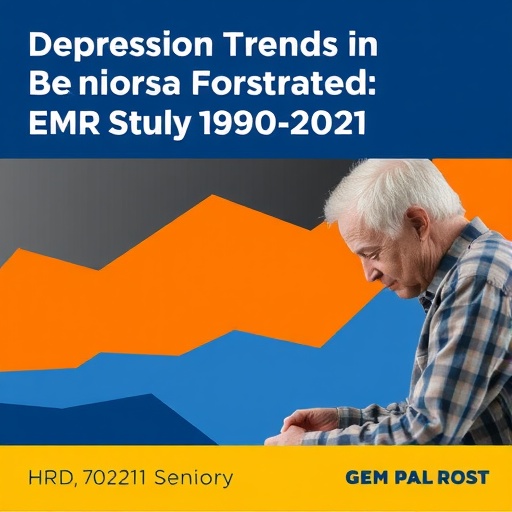In a groundbreaking study tracing the longitudinal trends of depression among seniors, researchers have harnessed the power of electronic medical records (EMR) mining to unravel the burden and risk factors associated with late-life depression from 1990 to 2021. This extensive multi-database investigation, integrating diverse datasets across decades, reveals nuanced insights into how depression manifests and evolves within aging populations, an area of mounting concern as global demographics shift toward older age groups.
The research leverages advanced EMR mining methodologies, deploying sophisticated algorithms to extract meaningful patterns from vast health data repositories. Such data-driven approaches overcome limitations of traditional epidemiological studies by enabling researchers to observe real-world clinical trajectories over extended periods. Consequently, this method illuminates the epidemiology of geriatric depression with unprecedented granularity, scaling from regional to international contexts.
One of the study’s pivotal discoveries is the evolving burden of depression among seniors, quantified through disability-adjusted life years (DALYs) and prevalence rates. The data depict a steady increase in depressive disorders within this demographic, emphasizing a heightened public health challenge that correlates with the rapid aging of populations worldwide. These trends underscore the necessity for targeted mental health interventions tailored explicitly to senior cohorts, whose psychosocial and biological vulnerabilities differ markedly from younger adults.
The temporal scope of the analysis, spanning over three decades, affords a unique vantage point to discern shifts in risk factors driving depression in late life. The study identifies not only traditional contributors such as chronic physical illness, social isolation, and economic hardship but also emerging determinants linked to lifestyle changes and healthcare delivery patterns. These findings challenge existing paradigms and call for an adaptive approach to mental health policy formulation and clinical practice.
Central to the study’s analytical framework is the integration of multi-source EMR data, including hospital records, outpatient visits, and pharmaceutical utilization statistics. This comprehensive data synthesis allows researchers to map depression trajectories and treatment responses with high fidelity. By correlating clinical variables and patient demographics, the study reveals complex interdependencies, such as the interplay between comorbid conditions and depression severity among seniors.
Furthermore, this multi-database study illuminates disparities in depression burden linked to socioeconomic status, gender, and geographic location. Notably, the results suggest that certain subpopulations of older adults experience disproportionately higher risks, driven by factors such as limited healthcare access and social determinants of health. This spatial and demographic heterogeneity highlights the urgent need for equitable mental health services that address these systemic inequalities.
The researchers also scrutinize pharmacological and non-pharmacological treatment patterns across the observed time frame, providing insights into how therapeutic paradigms have evolved in response to shifting disease burdens. The data suggest an increasing reliance on antidepressant medications juxtaposed with underutilization of psychosocial interventions, raising critical questions about the effectiveness and safety of current treatment regimens in elderly populations.
In terms of methodology, the employment of EMR mining techniques reflects a significant advancement, exploiting natural language processing and machine learning algorithms to process unstructured clinical notes alongside coded data. This dual approach enhances the accuracy of depression case identification and risk factor analysis, moving the field toward precision psychiatry in geriatrics.
The implications of this study extend beyond epidemiology and into the realm of healthcare resource allocation and policy-making. Given the observed escalation in depression-related burden, particularly in low-resource settings, the findings advocate for integrated healthcare models that bridge mental and physical health services to holistically address senior patients’ needs.
Moreover, the longitudinal nature of the research facilitates prediction modeling, enabling healthcare providers and policymakers to anticipate future trends in geriatric depression. Such foresight is instrumental in designing preventive strategies, allocating resources efficiently, and mitigating the long-term societal impact of untreated depression in aging populations.
Importantly, the study also underscores the significance of social determinants in modulating depression trajectories, advocating for community-based interventions that enhance social connectivity and socioeconomic support among seniors. These preventative measures could attenuate the progression of depressive symptoms and improve overall quality of life.
This research, by harnessing expansive digital health data, paves the way for future studies to further elucidate the pathophysiology and psychosocial dynamics of late-life depression. It sets a precedent for utilizing EMR mining not only to quantify disease burden but also to inform personalized intervention strategies adapted to the complex clinical profiles of elderly patients.
The study calls attention to the critical need for improving mental health literacy among caregivers and healthcare providers, emphasizing early detection and intervention strategies. Enhanced training and awareness could reduce stigma and facilitate timely treatment, thereby curbing the escalating disability burden caused by depression in seniors.
In conclusion, the synthesis of multi-decadal EMR data has provided a comprehensive portrait of depression’s trajectory in older adults, highlighting increasingly complex risk patterns, evolving treatment landscapes, and the pressing need for tailored, equity-focused healthcare policies. As the global population continues to age, these insights are invaluable for shaping responsive, evidence-based mental health frameworks that can effectively address the silent epidemic of late-life depression.
Subject of Research: Burden and risk factors of depression in seniors from 1990 to 2021 using EMR mining methods.
Article Title: Burden and risk factors of depression in seniors from 1990 to 2021: a multi-database study based on EMR mining methods.
Article References:
Xu, S., Sun, M. & Xiang, Y. Burden and risk factors of depression in seniors from 1990 to 2021: a multi-database study based on EMR mining methods. Transl Psychiatry 15, 414 (2025). https://doi.org/10.1038/s41398-025-03636-5
Image Credits: AI Generated
DOI: https://doi.org/10.1038/s41398-025-03636-5




